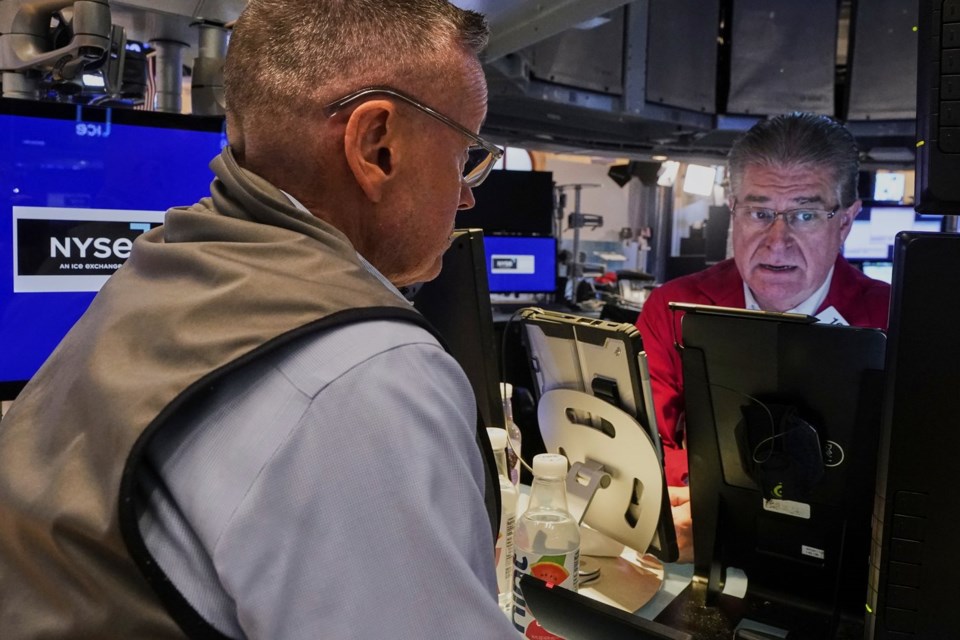NEW YORK (AP) — Wall Street is hanging around its records following some mixed profit reports, as General Motors and other big U.S. companies give updates on how much President Donald Trump’s tariffs are hurting or helping them. The S&P 500 was flat in early trading Tuesday, a day after inching to its latest all-time high. The Dow Jones Industrial Average was down 30 points, and the Nasdaq composite was down 0.1% from its own record. General Motors dropped 3.6% despite reporting a stronger profit than expected. The automaker said it’s still expecting a $4 billion to $5 billion hit this year from tariffs.
THIS IS A BREAKING NEWS UPDATE. AP’s earlier story follows below.
Wall Street dipped in premarket trading Tuesday, but indexes remained near record highs on another big day for corporate earnings reports.
Futures for the S&P 500 lost 0.1% before the bell, while futures for the Dow Jones Industrial Average and Nasdaq were each off 0.2%.
Homebuilders were the early winners, with D.R. Horton climbing nearly 7% after easily surpassing Wall Street's third-quarter sales and profit expectations. PulteGroup also topped analysts' forecasts, rising 1.7%, while Lennar rode the wave of optimism and was up 2.1%.
General Motors shed 3.6% in the early going after the automaker reported that its profit and revenue declined from the previous quarter. GM maintained its full-year guidance from May, however that forecast was cut as the company braced for a potential impact from auto tariffs as high as $5 billion in 2025.
Shares of Coca-Cola Co. were largely unchanged after the soda giant beat Wall Street profit expectations but fell a tad short on revenue projections. Coke said that its pricing rose 6% for the April-June period, making up for the 1% decline in case volumes both globally and in North America.
Elsewhere, in Europe at midday, Germany's DAX lost 1.1%, the CAC 40 in Paris gave up 0.9% and Britain's FTSE 100 was nearly unchanged.
In Asian trading, Japan’s benchmark surged and then fell back as it reopened from a holiday Monday following the ruling coalition's loss of its upper house majority in Sunday's election.
The Nikkei 225 shed 0.1% to 39,774.92.
Analysts said the market initially climbed as investors were relieved that Prime Minister Shigeru Ishiba vowed to stay in office despite the setback. But the election's outcome has added to political uncertainty and left his government without the heft needed to push through legislation.
A breakthrough in trade talks with the U.S. might win Ishiba a reprieve, but so far there's been scant sign of progress in negotiating away the threat of higher tariffs on Japan's exports to the U.S. beginning Aug. 1.
“Relief may be fleeting. Ishiba’s claim to leadership now rests on political duct tape, and history isn’t on his side. The last three LDP leaders who lost the upper house didn’t last two months,” Stephen Innes of SPI Asset Management said in a commentary.
Elsewhere, Hong Kong's Hang Seng rose 0.5% to 25,130.03, while the Shanghai Composite index advanced 0.6% to 3,581.86.
South Korea's Kospi sank 1.3% to 3,169.94, with investors concerned over next week's deadline for making a deal with U.S. President Donald Trump or facing 25% tariffs on all the country's exports to the U.S.
Many of Trump’s stiff proposed tariffs are paused after he extended the deadline to Aug. 1 to allow more time to reach potential trade deals that could lower those rates.
Australia's S&P/ASX 200 added 0.1% to 8,677.20. India's Sensex was flat.
In Thailand, the SET sank 1.1% after the government named Vitai Ratanakorn as the new future governor of the central bank. He is viewed as likely to be less independent than the current governor, raising concerns about the bank's independence, analysts said.
In energy trading, U.S. benchmark crude oil lost 61 cents to $65.34 per barrel, while Brent crude, the international standard, gave up 65 cents to $68.56 per barrel.
The U.S. dollar inched up to 147.40 Japanese yen from 147.38 yen. The euro gained to $1.1701 from $1.1696.
Elaine Kurtenbach And Matt Ott, The Associated Press



